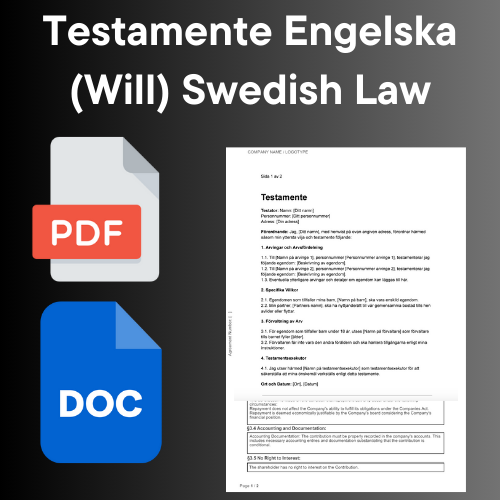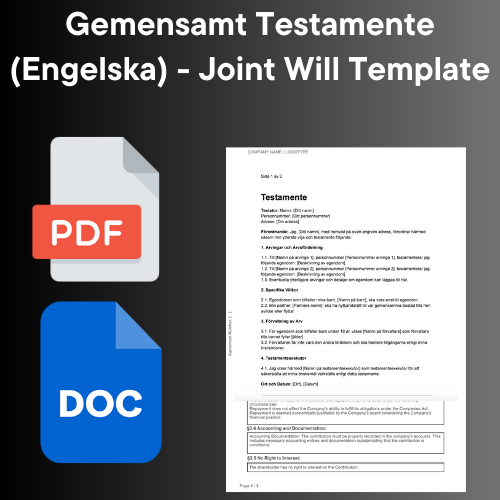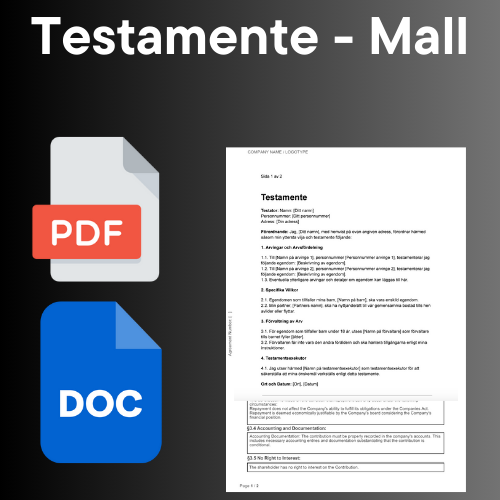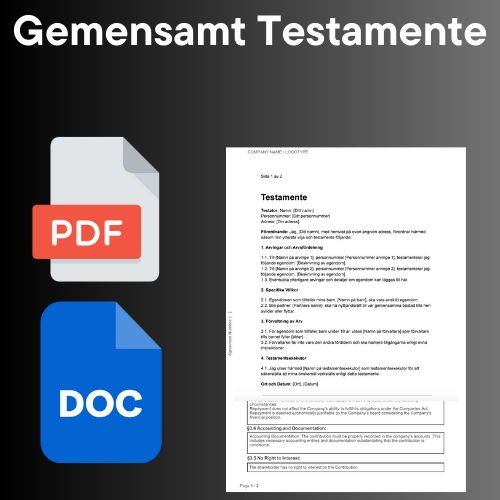When Does a Will Become Invalid? A Detailed Guide
Share
Table of contents
1. Formal Requirements for a Will
For a will to be valid in Sweden, it must meet certain formal requirements according to the Inheritance Code. These include, among other things, that the will must be in writing and signed by the testator and witnessed by two witnesses present at the same time.
In writing and signed
The will must be in writing and signed by the testator to be valid. This means that oral wills or wills that are not signed cannot be considered valid.
Two witnesses
The witnesses must be over 15 years of age and understand the meaning of witnessing a will. They must not be related to the testator or in any way benefit from the will. If these rules are not followed, the will can be declared invalid.
2. Content and structure of the will
Even if a will meets all the formal requirements, it can still be invalidated if it contains inaccuracies, if it is unclear or if there are contradictions in the document.
Clarity
A will must be clear and distinct in its language and expression to ensure that no disputes arise as to its meaning. If a will is unclear, it can lead to it not being able to be carried out according to the wishes of the testator, which in turn can result in the will being declared invalid in whole or in part.
Inaccuracies and contradictions
If there are obvious inaccuracies or contradictions in the will, these can also lead to annulment. An example of this could be that the testator specifies different distributions of the same asset in different parts of the will.
3. Testator's Ability and Influence
Another important aspect regarding the validity of a will is the mental state of the testator at the time of making the will as well as any influence from third parties.
Testator's ability
For a will to be valid, the testator must have been in full mental capacity when the will was made. If it can be proven that the testator suffered from a serious mental disorder or dementia when the will was written, it can be declared invalid.
Undue influence
If someone has exerted undue influence on the testator when drawing up the will, this can also lead to annulment. Examples of undue influence could be that a relative or other person forces or manipulates the testator to write the will in a certain way.
4. Mutual Will and Joint Will
There are also special rules for mutual wills (where two people, often spouses, make a will to each other) and joint wills (where several people draw up a will together). These types of wills have their own requirements and rules, and if these are not followed, the will may become invalid.
Revocation of mutual will
If one of the parties to a mutual will wishes to revoke or amend their will, this must be done in a correct manner. Failure to do so may result in the will being declared invalid.
Joint will and succession
In the case of a joint will, problems can arise during the succession if one of the testators has died and the joint will no longer reflects the wishes of the surviving testators. This can lead to the will or parts of it being declared invalid.
5. Changed Family Circumstances
Changes in family circumstances can also affect the validity of a will. For example, if the testator remarries, has a child or divorces after the will has been drawn up, this may lead to the will becoming invalid or needing to be changed.
Marriage and divorce
In Sweden, a previous will becomes invalid upon marriage unless otherwise stated in the will. In the event of a divorce, however, the will is not automatically affected, but it may need to be adjusted if the testator's wishes have changed.
Birth of children
If the testator has a child after the will is drawn up, and the child is not mentioned in the will, this may invalidate the will or parts of it, as children have a legal right to inherit.
6. Improper Storage and Lost Will
A will can also be declared invalid if it cannot be produced in the original or if it turns out to have been destroyed or lost in an unclear way.
Original document required
For a will to be valid, the original document must be presented. Copies are not valid unless the original can be found and there is no evidence that the original was accidentally destroyed.
Custody of the will
Keeping your will in a safe place, such as with a lawyer or in a safe deposit box, is important to ensure that it is not lost or destroyed. If the will is intentionally destroyed by the testator or someone else, this can also lead to the will becoming invalid.
7. Revocation of Wills
A will can always be revoked by the testator, but this must be done correctly to be valid. The easiest way to revoke a will is to write a new one, where it is clearly stated that the previous will is invalid.
Revocation by action
The will can also be revoked by destroying it by the testator himself, for example by tearing it to pieces or burning it. It is important to note that if there are multiple copies of a will, all copies must be destroyed for the revocation to be valid.
8. Blame of Testament
Finally, a will can be challenged by an heir or other party who believes the will is invalid for some reason. The impeachment must be filed within six months after the heir was served with the will, otherwise the will is considered valid even if there are defects.
Legal process
Probate is a legal process that requires strong evidence to invalidate a will. If the impeachment claim is successful, the will can be fully or partially declared invalid, which means that the inheritance is distributed according to the rules of the law or according to a previous will.
Summary
That a will may become invalid depends on a number of different factors, from formal errors to changed family circumstances and influence from third parties. It is therefore important to be careful when drawing up a will and to regularly review and update it to ensure that it remains valid and reflects the true wishes of the testator. By being aware of the most common reasons why a will may become invalid, you can minimize the risk of future disputes and ensure that your wishes are respected after your death.




